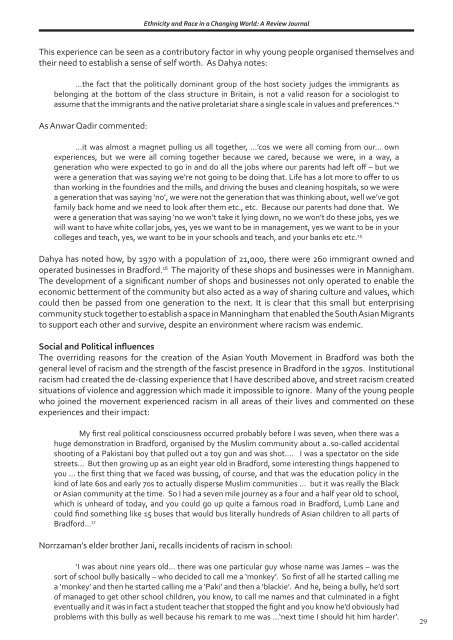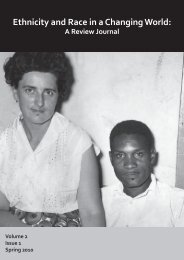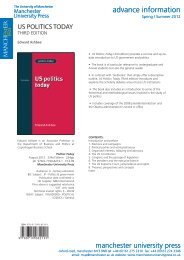Ethnicity and Race in a Changing World
Volume 2, Issue 1, 2011 - Manchester University Press
Volume 2, Issue 1, 2011 - Manchester University Press
You also want an ePaper? Increase the reach of your titles
YUMPU automatically turns print PDFs into web optimized ePapers that Google loves.
<strong>Ethnicity</strong> <strong>and</strong> <strong>Race</strong> <strong>in</strong> a Chang<strong>in</strong>g <strong>World</strong>: A Review JournalThis experience can be seen as a contributory factor <strong>in</strong> why young people organised themselves <strong>and</strong>their need to establish a sense of self worth. As Dahya notes:...the fact that the politically dom<strong>in</strong>ant group of the host society judges the immigrants asbelong<strong>in</strong>g at the bottom of the class structure <strong>in</strong> Brita<strong>in</strong>, is not a valid reason for a sociologist toassume that the immigrants <strong>and</strong> the native proletariat share a s<strong>in</strong>gle scale <strong>in</strong> values <strong>and</strong> preferences. 14As Anwar Qadir commented:...it was almost a magnet pull<strong>in</strong>g us all together, ...’cos we were all com<strong>in</strong>g from our... ownexperiences, but we were all com<strong>in</strong>g together because we cared, because we were, <strong>in</strong> a way, ageneration who were expected to go <strong>in</strong> <strong>and</strong> do all the jobs where our parents had left off – but wewere a generation that was say<strong>in</strong>g we’re not go<strong>in</strong>g to be do<strong>in</strong>g that. Life has a lot more to offer to usthan work<strong>in</strong>g <strong>in</strong> the foundries <strong>and</strong> the mills, <strong>and</strong> driv<strong>in</strong>g the buses <strong>and</strong> clean<strong>in</strong>g hospitals, so we werea generation that was say<strong>in</strong>g ‘no’, we were not the generation that was th<strong>in</strong>k<strong>in</strong>g about, well we’ve gotfamily back home <strong>and</strong> we need to look after them etc., etc. Because our parents had done that. Wewere a generation that was say<strong>in</strong>g ‘no we won’t take it ly<strong>in</strong>g down, no we won’t do these jobs, yes wewill want to have white collar jobs, yes, yes we want to be <strong>in</strong> management, yes we want to be <strong>in</strong> yourcolleges <strong>and</strong> teach, yes, we want to be <strong>in</strong> your schools <strong>and</strong> teach, <strong>and</strong> your banks etc etc. 15Dahya has noted how, by 1970 with a population of 21,000, there were 260 immigrant owned <strong>and</strong>operated bus<strong>in</strong>esses <strong>in</strong> Bradford. 16 The majority of these shops <strong>and</strong> bus<strong>in</strong>esses were <strong>in</strong> Mannigham.The development of a significant number of shops <strong>and</strong> bus<strong>in</strong>esses not only operated to enable theeconomic betterment of the community but also acted as a way of shar<strong>in</strong>g culture <strong>and</strong> values, whichcould then be passed from one generation to the next. It is clear that this small but enterpris<strong>in</strong>gcommunity stuck together to establish a space <strong>in</strong> Mann<strong>in</strong>gham that enabled the South Asian Migrantsto support each other <strong>and</strong> survive, despite an environment where racism was endemic.Social <strong>and</strong> Political <strong>in</strong>fluencesThe overrid<strong>in</strong>g reasons for the creation of the Asian Youth Movement <strong>in</strong> Bradford was both thegeneral level of racism <strong>and</strong> the strength of the fascist presence <strong>in</strong> Bradford <strong>in</strong> the 1970s. Institutionalracism had created the de-class<strong>in</strong>g experience that I have described above, <strong>and</strong> street racism createdsituations of violence <strong>and</strong> aggression which made it impossible to ignore. Many of the young peoplewho jo<strong>in</strong>ed the movement experienced racism <strong>in</strong> all areas of their lives <strong>and</strong> commented on theseexperiences <strong>and</strong> their impact:My first real political consciousness occurred probably before I was seven, when there was ahuge demonstration <strong>in</strong> Bradford, organised by the Muslim community about a..so-called accidentalshoot<strong>in</strong>g of a Pakistani boy that pulled out a toy gun <strong>and</strong> was shot.... I was a spectator on the sidestreets... But then grow<strong>in</strong>g up as an eight year old <strong>in</strong> Bradford, some <strong>in</strong>terest<strong>in</strong>g th<strong>in</strong>gs happened toyou ... the first th<strong>in</strong>g that we faced was buss<strong>in</strong>g, of course, <strong>and</strong> that was the education policy <strong>in</strong> thek<strong>in</strong>d of late 60s <strong>and</strong> early 70s to actually disperse Muslim communities ... but it was really the Blackor Asian community at the time. So I had a seven mile journey as a four <strong>and</strong> a half year old to school,which is unheard of today, <strong>and</strong> you could go up quite a famous road <strong>in</strong> Bradford, Lumb Lane <strong>and</strong>could f<strong>in</strong>d someth<strong>in</strong>g like 15 buses that would bus literally hundreds of Asian children to all parts ofBradford... 17Norrzaman’s elder brother Jani, recalls <strong>in</strong>cidents of racism <strong>in</strong> school:‘I was about n<strong>in</strong>e years old... there was one particular guy whose name was James – was thesort of school bully basically – who decided to call me a ‘monkey’. So first of all he started call<strong>in</strong>g mea ‘monkey’ <strong>and</strong> then he started call<strong>in</strong>g me a ‘Paki’ <strong>and</strong> then a ‘blackie’. And he, be<strong>in</strong>g a bully, he’d sortof managed to get other school children, you know, to call me names <strong>and</strong> that culm<strong>in</strong>ated <strong>in</strong> a fighteventually <strong>and</strong> it was <strong>in</strong> fact a student teacher that stopped the fight <strong>and</strong> you know he’d obviously hadproblems with this bully as well because his remark to me was ...‘next time I should hit him harder’.29






